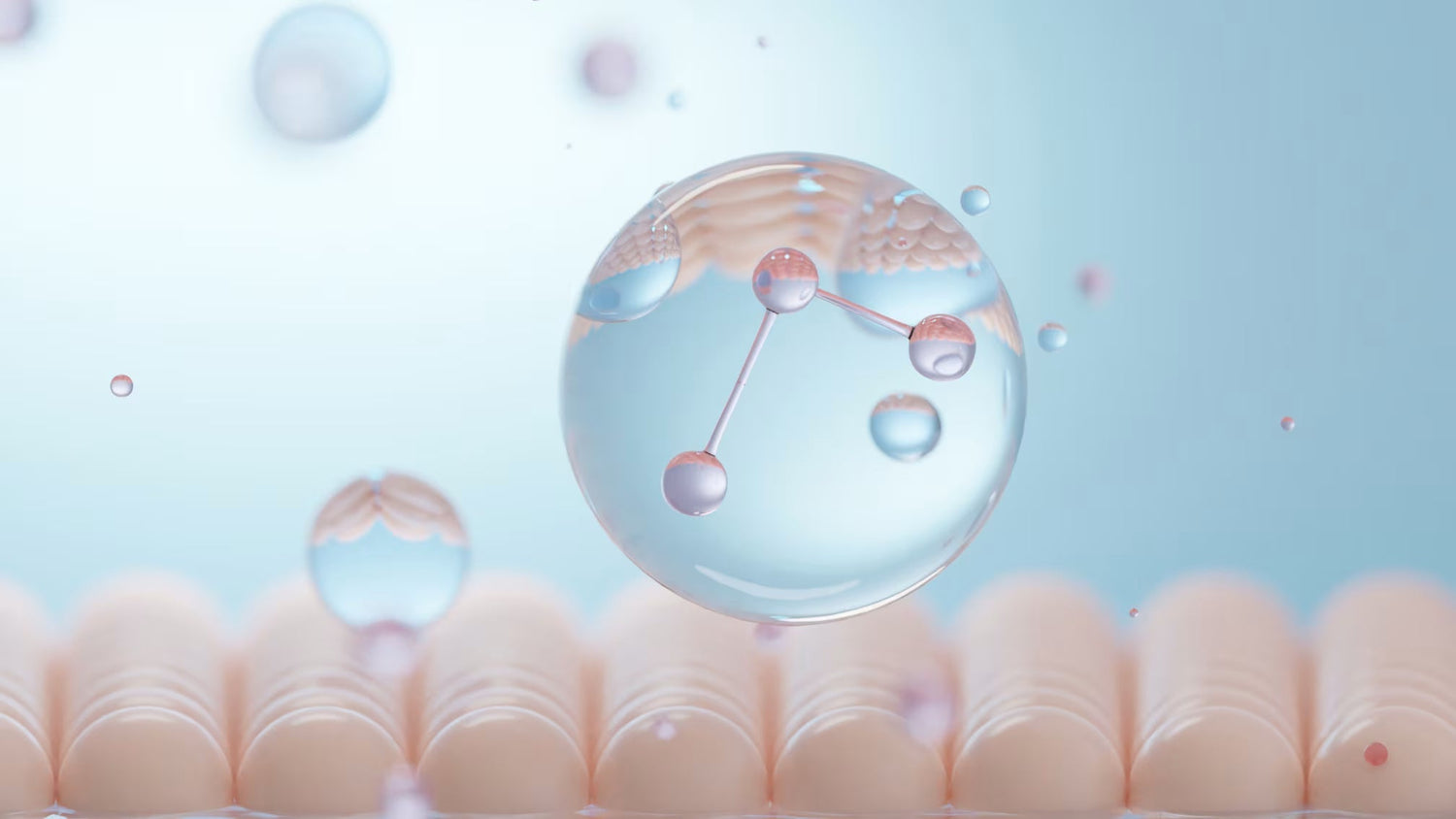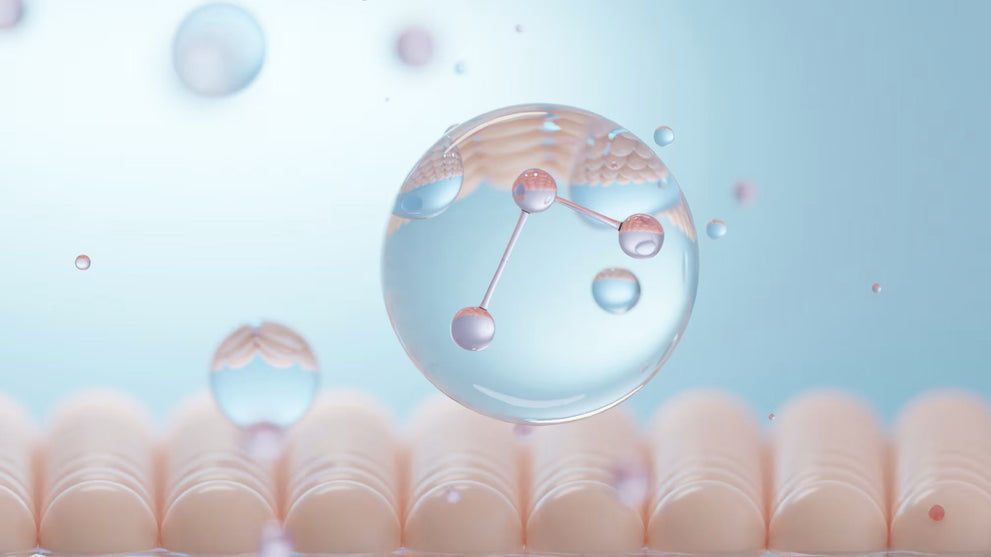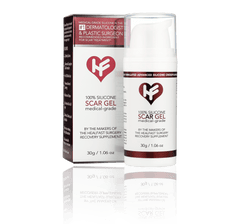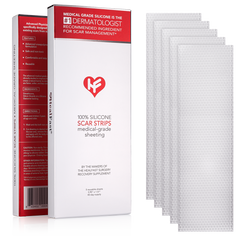

Collagen vs. Collagen Peptides: Which Is Best for Scar Healing?

Every scar carries a story - maybe yours comes from a C-section, a knee surgery, or even a long battle with acne. While scars remind us of resilience, most of us also wish they would fade a little faster and blend more naturally with our skin.
That’s usually when the search begins: creams, supplements, and advice from every corner of the internet. If you’ve gone down that path, you’ve probably stumbled upon two big names - collagen and collagen peptides. They sound almost identical, but here’s the catch: the way your body uses them is very different.
So, which one actually helps scars heal smoothly and faster? In this guide, we’ll dive into the collagen vs collagen peptides comparison and give you a clear path to supporting your scar recovery inside and out.
What Is Collagen?
Collagen is the most abundant protein in our body, making up about 30% of total protein. It acts as the “glue” that holds your tissues together - from skin, tendons, and ligaments to bones and cartilage.
When it comes to scar healing, collagen plays a direct role. After an injury or surgery, our body produces extra collagen at the wound site to close the gap and rebuild tissue. This process forms a scar.

Types of Collagen That Matter for Skin
- Type I Collagen: Most abundant in the skin, helps maintain firmness and elasticity.
- Type III Collagen: Supports skin, muscles, and blood vessels, playing a key role in tissue repair and healing.
- Type V Collagen: Found in certain skin layers, hair, and other tissues, it contributes to overall skin structure and integrity.
Without enough collagen, wounds heal more slowly, and scars may appear more prominent.
What Are Collagen Peptides?
Collagen peptides, also known as hydrolyzed collagen, are simply collagen proteins that have been broken down into much smaller chains of amino acids (1). This transformation makes them easier for the body to digest, better absorbed into the bloodstream, and more effective at reaching key areas, such as our skin, joints, and scar tissue.
When we take collagen peptides in the form of powders, capsules, or drinks, they are quickly absorbed into our system and can directly stimulate fibroblasts - the skin cells responsible for producing new collagen. This targeted boost helps support scar healing by encouraging fresh collagen formation exactly where our skin needs it most.
Does Collagen Reduce Scars?
Yes - but in a supportive, indirect way. Collagen doesn’t magically erase scars overnight, but it is essential for healthy healing. When our body produces enough collagen, scars form more smoothly, tissues regain elasticity, and over time, scars become softer and less noticeable.
How Collagen and Collagen Peptides Support Scar Healing?
Collagen and collagen peptides help our scars heal through several key mechanisms:
-
Supports Wound Closure – Collagen fibers knit together at the injury site, helping the wound close faster.
-
Improves Skin Strength – Stronger tissue reduces the risk of scars reopening or becoming thickened.
-
Promotes Elasticity – Adequate collagen keeps scars from becoming overly rigid or raised.
- Reduces Redness & Thickness – Balanced collagen helps scars blend more naturally with surrounding skin over time.
Collagen vs Collagen Peptides: Key Differences
Here’s a simple breakdown of the difference between collagen and collagen peptides:
|
Feature |
Collagen |
Collagen Peptides |
|
Structure |
Large protein |
Small, hydrolyzed fragments |
|
Absorption |
Harder to digest, less bioavailable |
Easily absorbed, highly bioavailable |
|
Function |
Provides structure to skin, bones, and tissues |
Stimulates collagen production and supports tissue repair |
|
Use in Scar Healing |
Produced naturally during wound healing |
Enhances and speeds up healing by boosting collagen synthesis |
|
Skin Benefits |
Maintains firmness and elasticity |
Improves hydration, elasticity, and scar texture |
Importance of Balancing Collagen Levels for Faster Scar Healing
While collagen is essential for wound repair and scar healing, too much or too little can affect how our scars form. Adequate collagen helps close wounds, strengthen tissue, and improve elasticity, but an overproduction can lead to raised, thick, or prominent scars. This is why balancing collagen levels is just as important as boosting them.
Managing collagen effectively ensures that scars heal smoother, flatter, and less noticeable, while supporting overall skin health. Alongside collagen supplementation, using topical scar care products can help regulate collagen overproduction at the scar site.
At HealFast, our silicone-based products, including gels, tapes, and sheets, are specially designed to manage collagen levels in healing skin. By reducing the overproduction of collagen, they help prevent scars from becoming raised or prominent, giving our skin the best chance to heal evenly.
Using these products in combination with collagen peptides can provide a comprehensive approach to faster, more balanced scar healing.
Tips for Using Collagen for Scars
-
Be Consistent: Take collagen peptides regularly for several weeks to support scar healing.
-
Boost Collagen Production: Vitamin C helps the body produce collagen, so include citrus fruits, berries, or supplements.
-
Stay Hydrated: Adequate water intake helps maintain skin elasticity and supports collagen function.
- Maintain a Balanced Diet: Protein, zinc, and antioxidants are important to support overall healing; don’t rely on collagen alone.
Related Blogs:
How Does Dimethicone Help Heal and Protect Scars?
How to Treat Itchy or Painful Scars After Pregnancy-Related Surgery?
How do Silicone Gel and Sheets help Flatten Hypertrophic Scars?
Frequently Asked Questions
Q 1. Which type of collagen is best for skin health?
Type I and Type III collagen are most essential for skin health, while collagen peptides support the body in producing and maintaining these key types for smoother, stronger skin.
Q 2. How long does it take collagen to improve scar healing?
Collagen supports scar healing within the first few weeks by closing the wound and forming new blood vessels. As healing continues, collagen production balances out, and over the following months to years, the remodeling stage reshapes the scar - helping it gradually flatten, soften, and fade.
Q 3. How do I know if my collagen levels are decreasing and increasing?
When collagen levels drop, you may notice wrinkles, sagging skin, slower scar healing, or brittle nails and hair (2). On the other hand, when collagen production improves through nutrition, supplements, or proper care, skin often looks firmer and smoother, scars heal more evenly, and hair and nails become stronger.
Reference:
1. León-López, A., Morales-Peñaloza, A., Martínez-Juárez, V. M., Vargas-Torres, A., Zeugolis, D. I., & Aguirre-Álvarez, G. (2019). Hydrolyzed collagen—Sources and applications. Molecules, 24(22), 4031. https://pmc.ncbi.nlm.nih.gov/articles/PMC6891674/
2. Cleveland Clinic. (2022, May 23). Collagen: What it is, types, function & benefits. https://my.clevelandclinic.org/health/articles/23089-collagen

- One of the most followed doctors online with 3.5+ million followers and 1 billion+ views in 2024 (Instagram, YouTube, TikTok, and Facebook)
- Board Certified Anesthesiologist and Clinical Assistant Professor who frequently teaches medical students, residents, and other physicians in medical school and hospital settings.
- Speaker and medical researcher having published 1 book, 3 book chapters, and over 57 scientific articles. Made over 100 presentations at national and international medical conferences on topics ranging from healthcare innovation, to nutrition, to patient safety.
- Serial entrepreneur having launched several healthcare companies with a track record of innovation within healthcare systems

Myro Figura, M.D.
- One of the most followed doctors online with 3.5+ million followers and 1 billion+ views in 2024 (Instagram, YouTube, TikTok, and Facebook)
- Board Certified Anesthesiologist and Clinical Assistant Professor who frequently teaches medical students, residents, and other physicians in medical school and hospital settings.
- Speaker and medical researcher having published 1 book, 3 book chapters, and over 57 scientific articles. Made over 100 presentations at national and international medical conferences on topics ranging from healthcare innovation, to nutrition, to patient safety.
- Serial entrepreneur having launched several healthcare companies with a track record of innovation within healthcare systems
Medical-grade Silicone Scar Gel "Semi-Solid Sheeting"
MEDICAL GRADE SILICONE SCAR GEL | From the Makers of the Industry-leading HealFast Surgery Recovery...
$23.99
Shop Now












